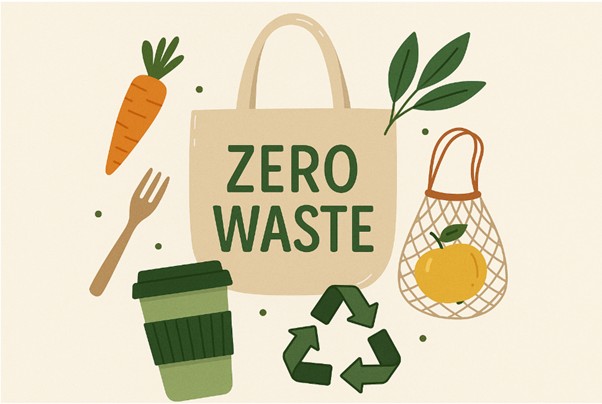
The Rise of Zero-Waste Restaurants: Is It Possible?
In 2025, sustainability is more than a buzzword—it’s a fundamental business practice. One of the boldest movements within the green revolution is the emergence of zero-waste restaurants. This dining model strives to eliminate all forms of waste, from food scraps to packaging materials. But how realistic is the zero-waste concept for restaurants, especially in fast-paced urban environments?
According to Chef Shajahan M. Abdul, founder of Restro Consultants Pvt. Ltd. (RCPL), achieving zero waste might be ambitious, but it is possible—and increasingly necessary.
What Does Zero-Waste Mean?
Zero-waste restaurants aim to send nothing to landfills. Every component—whether food, packaging, or disposable materials—is reused, recycled, composted, or upcycled. This approach promotes a circular kitchen system, where all resources are maximised, and waste is minimised.
Chef Abdul explains, “Zero-waste isn’t about perfection—it’s about intention. It’s the commitment to rethinking how every ingredient, material, and by-product can be given a second life.”
Why Zero-Waste Is Gaining
Momentum
The zero-waste movement has
gained momentum thanks to increased environmental awareness, policy shifts, and
customer expectations. Diners are now more conscious about the impact of their
food choices and are actively seeking out ethical, eco-friendly establishments.
Restaurant consultants from
RCPL have observed that restaurants promoting zero-waste practices tend to experience
higher engagement on social media, stronger brand loyalty, and even increased
foot traffic from environmentally conscious consumers.
Chef Shajahan M Abdul adds,
“Today’s diners don’t just eat—they vote with their forks. A zero-waste
philosophy tells customers you care about more than just profit.”
Key Principles of a Zero-Waste
Restaurant
According to restaurant
consultants at Restro Consultants Pvt Ltd (RCPL), adopting a zero-waste model
requires a complete mindset shift in how a restaurant operates. Here are the
core pillars:
1. Full Ingredient Utilization
Use every part of the
ingredient. For example, vegetable peels can be transformed into broths, meat
trimmings into stock, and citrus peels into cocktail garnishes or natural
cleaners.
Chef Abdul recommends menu
engineering to support zero-waste goals. “Design dishes that use overlapping
ingredients and reduce prep waste. A clever menu is a sustainable menu.”
2. Composting and Food
Recycling
Organic waste is composted
either on-site or through a partner service. Leftover food that is still safe
can be donated, while scraps are processed into compost for use in urban
gardens or on farms.
3. Elimination of Single-Use
Packaging
Zero-waste restaurants eliminate
plastic, Styrofoam, and other disposable materials in favour of compostable or
reusable alternatives. Many even introduce edible cutlery or container return
systems—a concept that RCPL has helped several clients implement across India.
4. Smart Inventory and AI
Integration
Overordering and spoilage are significant
sources of waste. Innovative inventory systems powered by AI can track usage,
forecast demand, and notify teams about expiration risks. This real-time data
ensures more precise purchasing.
As Chef Shajahan M Abdul puts
it, “Tech doesn’t just streamline the kitchen—it keeps your sustainability
goals on track.”
Success Stories: Restaurants
Doing It Right
Restaurants globally are
proving that zero-waste isn’t just a dream—it’s doable.
According to restaurant
consultants at Restro Consultants Pvt Ltd (RCPL), even reducing waste by 80–90%
brings significant operational savings and builds customer trust.
Challenges of Running a
Zero-Waste Restaurant
Let’s be realistic—achieving
zero waste comes with its own set of hurdles. Here are a few, along with
solutions advised by Chef Abdul and the RCPL team:
1. Initial Investment
Switching to reusable systems
or composting setups requires upfront costs. However, restaurant consultants
calculate that long-term savings on disposables and waste hauling offset these
expenses in 12–18 months.
2. Staff Training and Mindset
Zero-waste requires the entire
team’s buy-in. From prep chefs to servers, everyone must rethink their approach
to materials and food. Regular training, workshops, and written Standard
Operating Procedures (SOPs), developed by firms such as RCPL, are crucial.
3. Limited Supplier Options
Not all suppliers are aligned
with zero-waste goals. Restaurants must work with vendors who support bulk,
reusable packaging or local deliveries in compostable materials. Building these
partnerships takes time, but it pays off in terms of credibility and logistical
efficiency.
How to Start Your Journey
Toward Zero Waste
Chef Shajahan M Abdul shares a
practical roadmap for restaurants looking to reduce waste, if not go entirely
zero-waste:
1. Audit
Your Waste: Track what’s being thrown away, how often, and why.
2. Set
Clear Goals: Start small—aim to reduce food waste by 30% in the first quarter.
3. Train
Your Team: Conduct regular training to embed a zero-waste culture.
4. Revamp
Your Menu: Design with versatility in mind to reduce perishables.
5. Switch
to Smart Systems: Implement AI-based inventory and expiry management tools.
6. Communicate
with Customers: Inform diners about your zero-waste goals and how they can
contribute to them.
The Future of Dining Is
Waste-Free
Zero-waste dining may seem
idealistic, but it’s increasingly becoming the norm among forward-thinking
restaurants. With advancing technology, eco-conscious consumers, and growing
support from the food industry, zero waste is no longer “optional”—it’s
inevitable.
Chef Abdul believes, “The
kitchen of the future won’t just serve food—it’ll serve the planet. And the
zero-waste restaurant is where that future begins.”
Final Thoughts from Chef
Shajahan M Abdul
Zero waste isn’t about
achieving perfection overnight. It’s about taking consistent, innovative steps
toward a more responsible and profitable future. With expert guidance from
restaurant consultants and partners like Restro Consultants Pvt Ltd (RCPL),
restaurants can turn sustainability into a competitive advantage.
As Chef
Shajahan M Abdul wisely puts it:
“Waste is a choice. And so is impact. Choose better.”
Chef Abdul © Copyright 2024. All rights reserved.